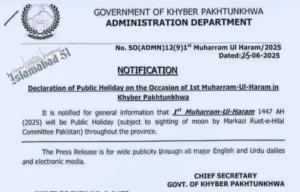PESHAWAR: The Khyber Pakhtunkhwa (KP) government has announced a public holiday across the province on the occasion of the Islamic New Year, 1st Muharram.
According to a official notification issued by the provincial government, the holiday on 1st Muharram 1447 will be observed based on the announcement of the Central Ruet-e-Hilal Committee regarding the sighting of the moon.
KP Government Public Holiday 1st Muharram;
According to the notification, the KP government has declared a public holiday on 1st Muharram across the province. The holiday will be observed as per the moon sighting announced by the Central Ruet-e-Hilal Committee.

On the other hand, during Muharram-ul-Haram, the cities of Peshawar, D.I. Khan, Tank, Kohat, and Hangu in Khyber Pakhtunkhwa have been designated as the most sensitive.
— ALSO READ —
KP government plans transition to funded pension system by 2045
Inspector General of Police Khyber Pakhtunkhwa, Zulfiqar Hamid, stated that the army will also be on standby to maintain law and order, with 70,000 police personnel fulfilling security duties across the province.
Under the chairmanship of Interior Minister Mohsin Naqvi, a meeting was held regarding security and other arrangements for Muharram-ul-Haram.
During the meeting, Interior Minister emphasized the need for comprehensive security measures to thwart nefarious designs of anti-state elements.
Mohsin Naqvi also emphasized a zero-tolerance policy against inciting materials, strict monitoring of social media, and the use of modern technology for overseeing processions and gatherings.
— ALSO READ —
Urdu Nikahnama not officially available, reveals Law Ministry
Earlier, an important meeting of police officers under the supervision of DPO Dera Sajjad Ahmed Sahibzada was held to finalize security arrangements for the upcoming Muharram-ul-Haram.
Police officers were briefed on all matters, including patrolling, mobile checkpoints, and ensuring security in their respective areas.
It was emphasized that there should be no compromise on any aspect of security, with the cooperation of local leaders and religious scholars being pivotal.














